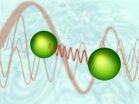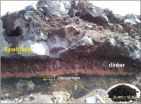(Press-News.org) Philadelphia, PA -- Brain stimulation treatments, like electroconvulsive therapy (ECT) and transcranial magnetic stimulation (TMS), are often effective for the treatment of depression. Like antidepressant medications, however, they typically have a delayed onset. For example, a patient may receive several weeks of regular ECT treatments before a full response is achieved.
Thus, there is an impetus to develop antidepressant treatments that act to rapidly improve mood.
Low field magnetic stimulation (LFMS) is one such potential new treatment with rapid mood-elevating effects, as reported by researchers at Harvard Medical School and Weill Cornell Medical College.
"LFMS is unlike any current treatment. It uses magnetic fields that are a fraction of the strength but at higher frequency than the electromagnetic fields used in TMS and ECT," explained first author Dr. Michael Rohan.
Indeed, the potential antidepressant properties of LFMS were discovered accidentally, while researchers were conducting an imaging study in healthy volunteers. This led Rohan and his colleagues to conduct a preliminary study in which they identified the imaging parameters that seemed to be causing the antidepressant effect.
They then designed and constructed a portable LFMS device, which delivers a low strength, high frequency, electromagnetic field waveform to the brain. The next step was to test the device in depressed patients, the results of which are published in the current issue of Biological Psychiatry.
A total of 63 currently depressed patients, diagnosed with either major depressive disorder or bipolar disorder, participated in the study and were randomized to receive a single 20-minute treatment of real LFMS or sham LFMS, where the device was on but the electromagnetic fields were inactive. Since neither the patients nor the researchers knew which treatment each person actually received, the true effect of the LFMS could be measured.
An immediate and substantial improvement in mood was observed in the patients who received real LFMS, compared to those who received the sham treatment. There were no reported side effects.
This finding suggests that LFMS may have the potential to provide immediate relief of depressed mood, perhaps even in emergency situations. It also confirms the success of the device's design.
"The idea that weak electrical stimulation of the brain could produce beneficial effects on depression symptoms is somewhat surprising," said Dr. John Krystal, Editor of Biological Psychiatry. "Yet the data make a compelling case that this safe approach deserves further study."
Rohan confirmed that additional research is underway to find the best parameters for LFMS use in the clinical treatment of depression. Further research will also be necessary to evaluate the effects of multiple compared to single treatments, and how long the antidepressant effects last following treatment.
INFORMATION:
The article is "Rapid Mood-Elevating Effects of Low Field Magnetic Stimulation in Depression" by Michael L. Rohan, Rinah T. Yamamoto, Caitlin T. Ravichandran, Kenroy R. Cayetano, Oscar G. Morales, David P. Olson, Gordana Vitaliano, Steven M. Paul, and Bruce M. Cohen (DOI: 10.1016/j.biopsych.2013.10.024). The article appears in Biological Psychiatry, Volume 76, Issue 3 (August 1, 2014), published by Elsevier.
Low strength brain stimulation may be effective for depression
New study in Biological Psychiatry
2014-07-22
ELSE PRESS RELEASES FROM THIS DATE:
Boosting the force of empty space
2014-07-22
This news release is available in German.
Vacuum is not as empty as one might think. In fact, empty space is a bubbling soup of various virtual particles popping in and out of existence – a phenomenon called "vacuum fluctuations". Usually, such extremely short-lived particles remain completely unnoticed, but in certain cases vacuum forces can have a measurable effect. A team of researchers from the Weizmann Institute of Science (Rehovot, Israel) and the Vienna University of Technology has now proposed a method of amplifying these forces by several orders of magnitude ...
Anti-cancer drug kicks HIV out of hiding
2014-07-22
A pilot study by HIV researchers from Aarhus University and Aarhus University Hospital in Denmark has shown that an anti-cancer drug can activate hidden HIV. The researchers found that the anti-cancer drug romidepsin increased the virus production in HIV-infected cells between 2.1 and 3.9 times above normal and that the viral load in the blood increased to measurable levels in five out of six patients with HIV infection.
A pilot study
The results were presented today as breaking news at the annual international AIDS conference in Melbourne, Australia. The pilot study ...
Jeju Island is a live volcano
2014-07-22
In Jeju, a place emerging as a world-famous vacation spot with natural tourism resources, a recent study revealed a volcanic eruption occurred on the island. The Korea Institute of Geoscience and Mineral Resources (KIGAM) indicated that there are the traces that indicated that a recent volcanic eruption was evident 5,000 years ago. That is the first time to actually find out the date when lava spewed out of a volcano 5,000 years ago in the inland part of the island as well as the one the whole peninsula.
The research team led by Dr. Jin-Young Lee confirmed in results ...
Unique study focuses on combined treatment approach for locally advanced pancreatic cancer
2014-07-22
LOS ANGELES (July 21, 2014) – Investigators at the Cedars-Sinai Samuel Oschin Comprehensive Cancer Institute are developing a novel, multistep investigational treatment for one of the most complex and difficult-to-treat forms of the disease, locally advanced pancreatic cancer.
Locally advanced pancreatic cancer has the lowest survival rate of any solid tumor, with a cumulative five-year survival rate of only 4 percent for all stages of disease. Surgery is rarely an option for patients because tumors often involve vital blood vessels. Chemotherapy and radiotherapy given ...
Vanderbilt discovery may advance colorectal cancer diagnosis and treatment
2014-07-22
A Vanderbilt University-led research team has identified protein "signatures" of genetic mutations that drive colorectal cancer, the nation's second leading cause of cancer deaths after lung cancer.
The technological tour de force, described in the current issue of the journal Nature as the first integrated "proteogenomic" characterization of human cancer, "will enable new advances" in diagnosing and treating the disease, the scientists concluded.
"It's a first-of-its-kind paper. I think it's a very important advance in the field," said senior author Daniel Liebler, ...
Low-income students in charter high schools less likely to engage in risky behavior
2014-07-22
A new UCLA-led study suggests that a higher quality educational environment may help improve health outcomes
Low-income minority adolescents who were admitted to high-performing public charter high schools in Los Angeles were significantly less likely to engage in risky health behaviors than their peers who were not admitted to those schools, according to a new UCLA-led study.
These students also scored significantly better on California state standardized math and English tests.
While numerous previous studies have shown a link between health and K-12 education, ...
Strategies to preserve myelin during secondary degeneration following neurotrauma
2014-07-22
Researchers at the University of Western Australia, led by Associate Professor Melinda Fitzgerald, have discovered that preventing abnormalities in the insulating sheath surrounding nerve cells is associated with better function following neurotrauma.
Following injury to the central nervous system, damage spreads away from the initial impact in a process known as secondary degeneration. Dr Fitzgerald emphasises that "In order to develop treatments for secondary degeneration, we need to understand the biochemical reactions that occur in tissue that succumbs to spreading ...
Ginkgo biloba enhances neurogenesis and improves recovery following a stroke in mice
2014-07-22
Led by Dr. Zahoor A. Shah, Dr. Shadia E. Nada and Jatin Tulsulkar (graduate student), researchers at the University of Toledo, Toledo, OH, have discovered that mice treated with Ginkgo biloba 4 hours after inducing experimental stroke and then daily for seven days had improved recovery and less brain damage than the control mice. It was also observed that Ginkgo biloba treated mice had enhanced neurogenesis, partly due to the increased protein expression of hemeoxygenase 1, an antioxidant gene that also has a role in neurogenesis. Pertinently, mice lacking the hemeoxygenase ...
Fires are a major cause of wind farm failure, according to new research
2014-07-22
*** UPDATE TO NEWS RELEASE: 'Fires are a major cause of wind farm failure, according to new research' ***
Message to news release subscribers from Imperial College London Press Office:
Following discussion with reporters we wish to draw attention to further information relating to the News Release issued under embargo for Thursday 17 July 2014: "Fires are a major cause of wind farm failure, according to new research". A version of this note will be appended to the online news release and news story and both will be updated accordingly.
1. The purpose of the research ...
Cleveland Clinic researchers discover neuroprotective role of immune cell
2014-07-22
July 22, 2014, Cleveland: A type of immune cell widely believed to exacerbate chronic adult brain diseases, such as Alzheimer's disease and multiple sclerosis (MS), can actually protect the brain from traumatic brain injury (TBI) and may slow the progression of neurodegenerative diseases, according to Cleveland Clinic research published today in the online journal Nature Communications.
The research team, led by Bruce Trapp, PhD, Chair of the Department of Neurosciences at Cleveland Clinic's Lerner Research Institute, found that microglia can help synchronize brain firing, ...
LAST 30 PRESS RELEASES:
Black soldier fly larvae show promise for safe organic waste removal
People with COPD commonly misuse medications
How periodontitis-linked bacteria accelerate osteoporosis-like bone loss through the gut
Understanding how cells take up and use isolated ‘powerhouses’ to restore energy function
Ten-point plan to deliver climate education unveiled by experts
Team led by UC San Diego researchers selected for prestigious global cancer prize
Study: Reported crop yield gains from breeding may be overstated
Stem cells from human baby teeth show promise for treating cerebral palsy
Chimps’ love for crystals could help us understand our own ancestors’ fascination with these stones
Vaginal estrogen therapy not linked to cancer recurrence in survivors of endometrial cancer
How estrogen helps protect women from high blood pressure
Breaking the efficiency barrier: Researchers propose multi-stage solar system to harness the full spectrum
A new name, a new beginning: Building a green energy future together
From algorithms to atoms: How artificial intelligence is accelerating the discovery of next-generation energy materials
Loneliness linked to fear of embarrassment: teen research
New MOH–NUS Fellowship launched to strengthen everyday ethics in Singapore’s healthcare sector
Sungkyunkwan University researchers develop next-generation transparent electrode without rare metal indium
What's going on inside quantum computers?: New method simplifies process tomography
This ancient plant-eater had a twisted jaw and sideways-facing teeth
Jackdaw chicks listen to adults to learn about predators
Toxic algal bloom has taken a heavy toll on mental health
Beyond silicon: SKKU team presents Indium Selenide roadmap for ultra-low-power AI and quantum computing
Sugar comforts newborn babies during painful procedures
Pollen exposure linked to poorer exam results taken at the end of secondary school
7 hours 18 mins may be optimal sleep length for avoiding type 2 diabetes precursor
Around 6 deaths a year linked to clubbing in the UK
Children’s development set back years by Covid lockdowns, study reveals
Four decades of data give unique insight into the Sun’s inner life
Urban trees can absorb more CO₂ than cars emit during summer
Fund for Science and Technology awards $15 million to Scripps Oceanography
[Press-News.org] Low strength brain stimulation may be effective for depressionNew study in Biological Psychiatry

